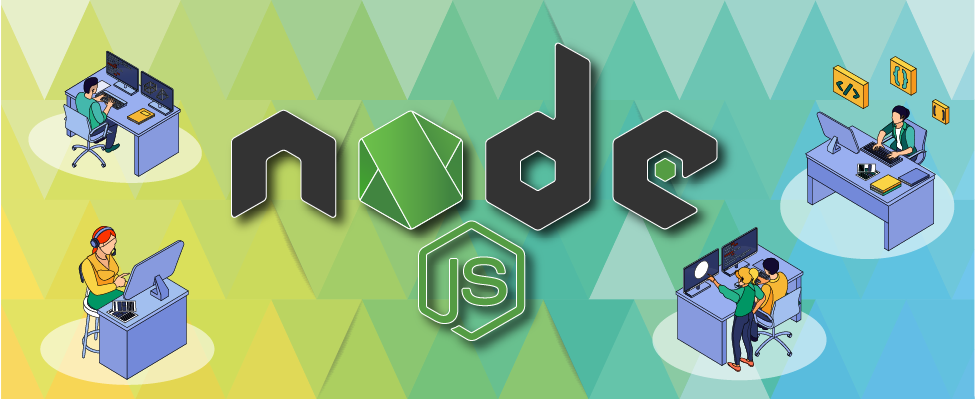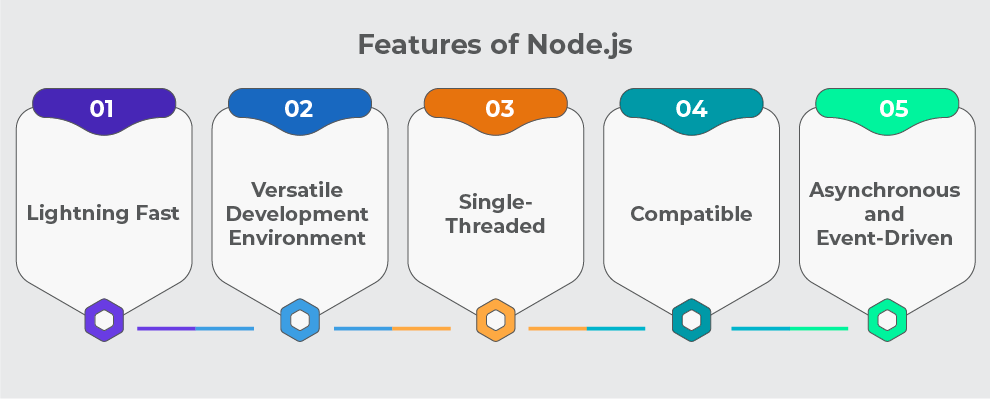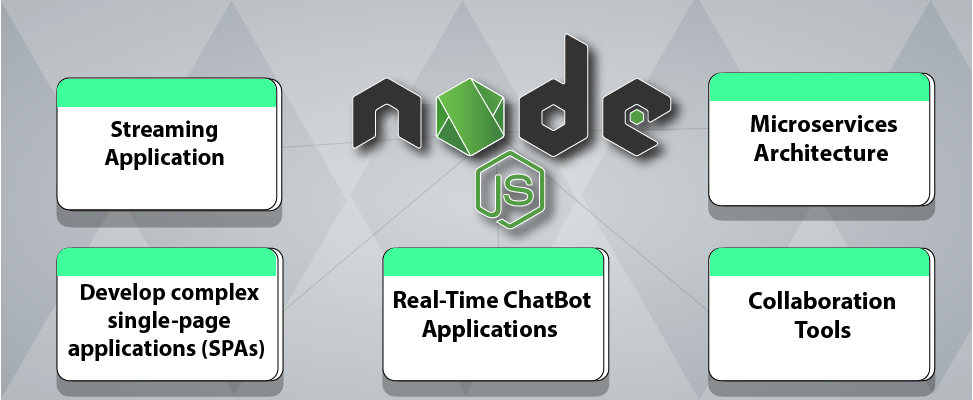Table of Contents
ToggleIntroduction
Node.js is one of the most robust and indispensable tools for creating web and mobile apps. With its unparalleled performance and highly flexible environment, Node.js has become a favorite among developers and one of the best technologies used in web development, with 42.65% of developers using it worldwide. In this blog, we’ll explore what Node.js is.? And what is it used for?
What is Node.js?

Node.js is a cross-platform JavaScript runtime environment used for web app development. It lets developers write code in JavaScript for server-side scripting. With its fast performance, flexible development environment, and rich library ecosystem, it provides developers with a powerful tool to build high-quality and innovative applications.

Don't miss out on your chance to work with the best
apply for top global job opportunities today!
What is a Runtime Environment?
A runtime environment brings together all the essential components for a programming language to run and execute the code. So, Node.js is a JavaScript runtime environment that enables JavaScript to be used beyond the browser. Through Node.js, developers can access resources and execute JavaScript outside the browser. Like JavaScript, Node.js has its own runtime environment, i.e., the V8 Google Engine. This helps Node.js translate code into machine code.
Features of Node.js
The following are the standout features of Node.js:

Lightning Fast: Node.js runs under the V8 JavaScript Engine in Google Chrome, which helps with rapid code execution. An application built with Node.js does not accumulate data in the memory buffer. Instead of processing the entire data set at once, it breaks the application into smaller, more manageable chunks. This, in turn, contributes significantly to speeding up the application.
Versatile Development Environment: Developers can use JavaScript for building both the back and front end of applications. This will simplify the development process while minimizing the need for additional resources.
Single-Threaded: Node.js with a single-threaded event-looping paradigm can handle a far higher volume of requests than Apache HTTP Server. The event method lets the Node.js server respond in a non-blocking manner. As a result, its server becomes extremely scalable.
Compatible: Node.js provides great flexibility for developers to build high-quality and innovative applications. They can choose any preferred programming language and work on different platforms without having to worry about compatibility issues.
Asynchronous and Event-Driven: What sets Node.js apart from other runtime environments is that it is all-library, and its APIs are asynchronous or non-blocking in nature. For this reason, the Node.js server doesn’t wait for an API to return data; once it calls an API, it proceeds to the following API: Later, its event notification allows the server to receive and respond to the previous API call.
What is Node.js Used For?
Node.js is undoubtedly an indispensable tool that lets developers build scalable and high-performing network applications. The following are some of the best tools we can create using this JavaScript framework; let’s have a look at them one by one:

Streaming Application
Node.js comes with the Native Stream API, which makes it an ideal choice to build streaming web apps. Instead of downloading the entire application at once, the Native Stream API lets you download only some parts of the application and the rest of it whenever required. It does this to optimize performance and facilitate the dynamic downloading process. Besides, a built-in interface for writing and reading streams is provided. Through which users can easily monitor and process streams. In addition, using Node.js, developers won’t need cache memory to store temporary data because it provides an open link between the data from the streaming app on the server and the local system. The best example of this streaming application built by Node.js is Netflix. It is one of the largest media service providers for video streaming, with more than 100 million users.
Complex single-page applications (SPAs)
Node.js asynchronous calls and efficient I/O operations make it the best fit for building SPAs. Recently, SPA has been getting popular as it can provide a similar experience as a desktop application. What makes Node.js exceptional is that it uses JavaScript as a language. Hence, switching between the contexts takes less time. Also, developers have the convenience of using the same language for both the front-end and the back-end of their applications. Because the client renders all the HTML and the server (backend) transmits data to the client, Node.js is the ideal choice for data-driven single-page applications.
Real-Time ChatBot Applications
Chatbots are used by all online websites and e-commerce sites; they have become an integral part of online business. Node.js has all the essential components required to build real-time chatbot applications. Developers can easily generate server-side events by using the events API and pushing notifications. Implementing real-time chat features with WebSocket libraries such as socket.io or WebSocket-node is straightforward. This library allows two-way exchange via an open connection, which contributes to the easy creation of a real-time chat app. Some examples of this are Skype and Facebook Messenger, which use the Node.js Event API for real-time chat.
Microservices Architecture
In modern-day software development, microservices architecture is becoming widely popular. This microservices architecture has these tiny independent services, each of which performs a specific task in the business logic of a web application. Node.js, with its features like high scalability, maintainability, lightweight nature, and efficiency, makes it the perfect fit for developing microservice architecture. Some of the big companies, such as Facebook, Netflix, and Amazon, use microservices architectures for their applications. Overall, implementing Node.js into their application can boost their speed while reducing their code base.
Collaboration Tools
Node.js framework is favored by many developers to create collaboration tools to use in many different tasks like project management, audio and video conferencing, collaborative document editing, co-browsing, and more. Because of its WebSocket and Event API, it helps manage many I/O operations effectively. Simultaneously, it allows several individuals to add to a project management system via comment, with a simple update of the status, and attach files or media to a specific project. Therefore, its ability to process tons of I/O requests and events enables Node.js to develop collaboration tools as software solutions.
Node.js Developer Jobs
- Full Stack Developer: If you’re already familiar with JavaScript, then using Node.js, you use JavaScript for server-side. Also, frameworks like Express.js and Angular go well with it, and you could be a full-stack developer in the shortest time.
- DevOps Engineer: A Node.js developer has good experience in deploying and maintaining the infrastructure. So, they could be a DevOps engineer who ensures the reliability of Node.js apps during production.
- Freelance Consultant: If you enjoy working independently, you can become a freelance consultant and take on various projects, from architect design to various aspects of software development.
- API Developer: Node.js is mostly used for RESTful APIs; if you’re interested in designing and maintaining APIs, then you can become an API developer.
Node.js: A Preferred Choice for Developers
Node.js’ standout features like non-blocking I/O, asynchronous nature, and priority-based processing attract many developers. The best part is that developers don’t need to keep generating a new thread for each connection, so managing the load of thousands of users accessing the server simultaneously will become super easy. One of the perks of using Node.js is that it is JSON-compatible. While many server-side languages like Ruby on Rails (RoR) and PHP need to translate between binary models, that’s not the case with Node.js, which supports the NoSQL database.
Thus, developing the RESTful API is on the fly, and it can seamlessly integrate with one of the most popular data transfer standards. Moreover, it offers numerous npm libraries and reusable templates that can help speed up development with significantly less effort. Templates drastically reduce the size of the application’s many underlying issues. By using it with JavaScript for front- and back-end development, it can lead to faster time-to-market. Lastly, it is perfect for developing cross-platform, real-time online apps; the development team doesn’t need to spend more time writing separate code for creating native apps. If you’re searching for a Node.js developer role, then sign up with Olibr.
Take control of your career and land your dream job
sign up with us now and start applying for the best opportunities!

FAQs
Node.js’s performance in executing JavaScript server-side is phenomenal. It can be used for both front-end and back-end development. Some of the features, like the non-blocking, event-driven model, ensure streamlined functionality. Moreover, it is best for creating data-laden, real-time applications.
If you’re working on a project that requires real-time data and a lot of I/O operations with high-speed rendering, then you can choose Node.js for your app development.
Of course, you can. Its non-blocking, event-driven architecture allows you to build both front-end and back-end development.
Node.js features like single-threaded, scalability, and non-blocking architecture with high performance beat the conventional server-side.
Node.js is popular for its swiftness, scalability, and efficient software solutions, due to which it is used in tech and IT services for building scalable applications and APIs; finance and banking for effective concurrency and data processing; media and entertainment for handling high-traffic and quick rendering; e-commerce and retail for real-time updates and prompt request handling; and real-time tracking applications.
Node.js is the runtime environment, and express.js is the web application framework for Node.js. Both of these technologies play a crucial role in the JavaScript ecosystem.
A web application is software that runs on a web server and is accessed by any web browser.

